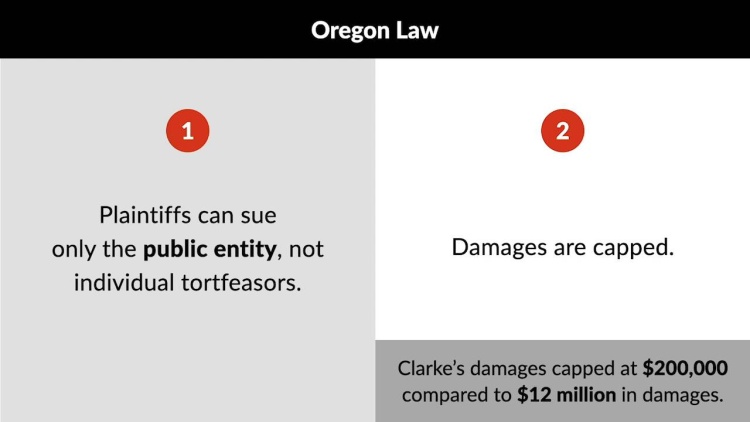Clarke v. Oregon Health Sciences University
Oregon Supreme Court
175 P.3d 418 (2007)

- Written by Sean Carroll, JD
Facts
Jordaan Clarke underwent surgery at the Oregon Health Sciences University (OHSU) (defendant), a state entity, when he was three months old. Due to the negligence of OHSU’s employees, the surgery caused permanent brain damage, rendering him disabled. Clarke’s guardian (plaintiff) brought suit against OHSU and its employees, seeking $17 million. Oregon had a law capping tort damages against the state at $200,000. The employees moved to dismiss the claim against them based on the Oregon Tort Claims Act (OTCA) which, as amended, provided that the only cause of action available for victims of torts committed by public employees is an action against the public entity the employees work for. The trial court granted judgment on the pleadings to Clarke against OHSU, and granted the OHSU employees’ motion to dismiss. The court of appeals affirmed the judgment against OHSU, but reversed the judgment for the employees, holding that the exclusive remedy provision in OTCA combined with the damages cap violated Article I, section 10 of the Oregon Constitution (Remedy Clause). The Remedy Clause provided that while the state legislature is entitled to alter and perhaps abolish old remedies, it may not deny a remedy entirely.
Rule of Law
Issue
Holding and Reasoning (De Muniz, C.J.)
Concurrence (Balmer, J.)
What to do next…
Here's why 899,000 law students have relied on our case briefs:
- Written by law professors and practitioners, not other law students. 47,000 briefs, keyed to 994 casebooks. Top-notch customer support.
- The right amount of information, includes the facts, issues, rule of law, holding and reasoning, and any concurrences and dissents.
- Access in your classes, works on your mobile and tablet. Massive library of related video lessons and high quality multiple-choice questions.
- Easy to use, uniform format for every case brief. Written in plain English, not in legalese. Our briefs summarize and simplify; they don’t just repeat the court’s language.





